The Influence of Society and Family on Child Development and Behavior
VerifiedAdded on 2021/02/19
|5
|961
|81
Essay
AI Summary
This essay explores the multifaceted impact of the social world on childhood development. It defines childhood and highlights the significance of both pre-operational and operational stages. The main body delves into how societal factors, family dynamics, and learning processes shape a child's behavior and personality. The essay underscores the importance of observation and social learning, referencing Bandura's social learning theory to explain how children acquire knowledge and behaviors. It examines how ethics, morals, and social beliefs are instilled within children, influencing their long-term behavioral patterns. The conclusion summarizes the strong influence of the social world on a child's learning process, emphasizing the critical roles of family and society in shaping a child's upbringing and behavior. The essay also discusses the importance of positive social learning in fostering desirable behaviors and facilitating social change.
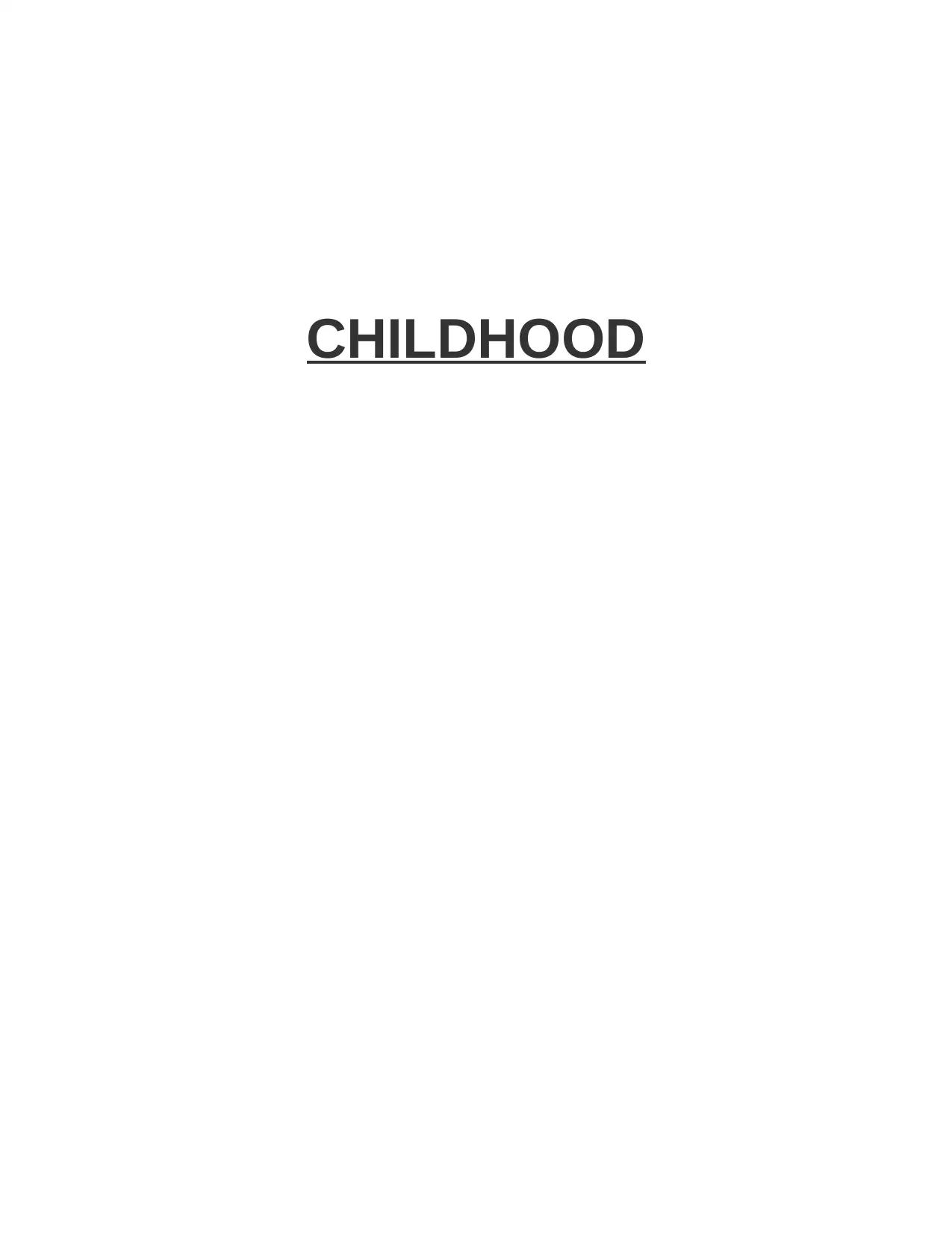
CHILDHOOD
Paraphrase This Document
Need a fresh take? Get an instant paraphrase of this document with our AI Paraphraser
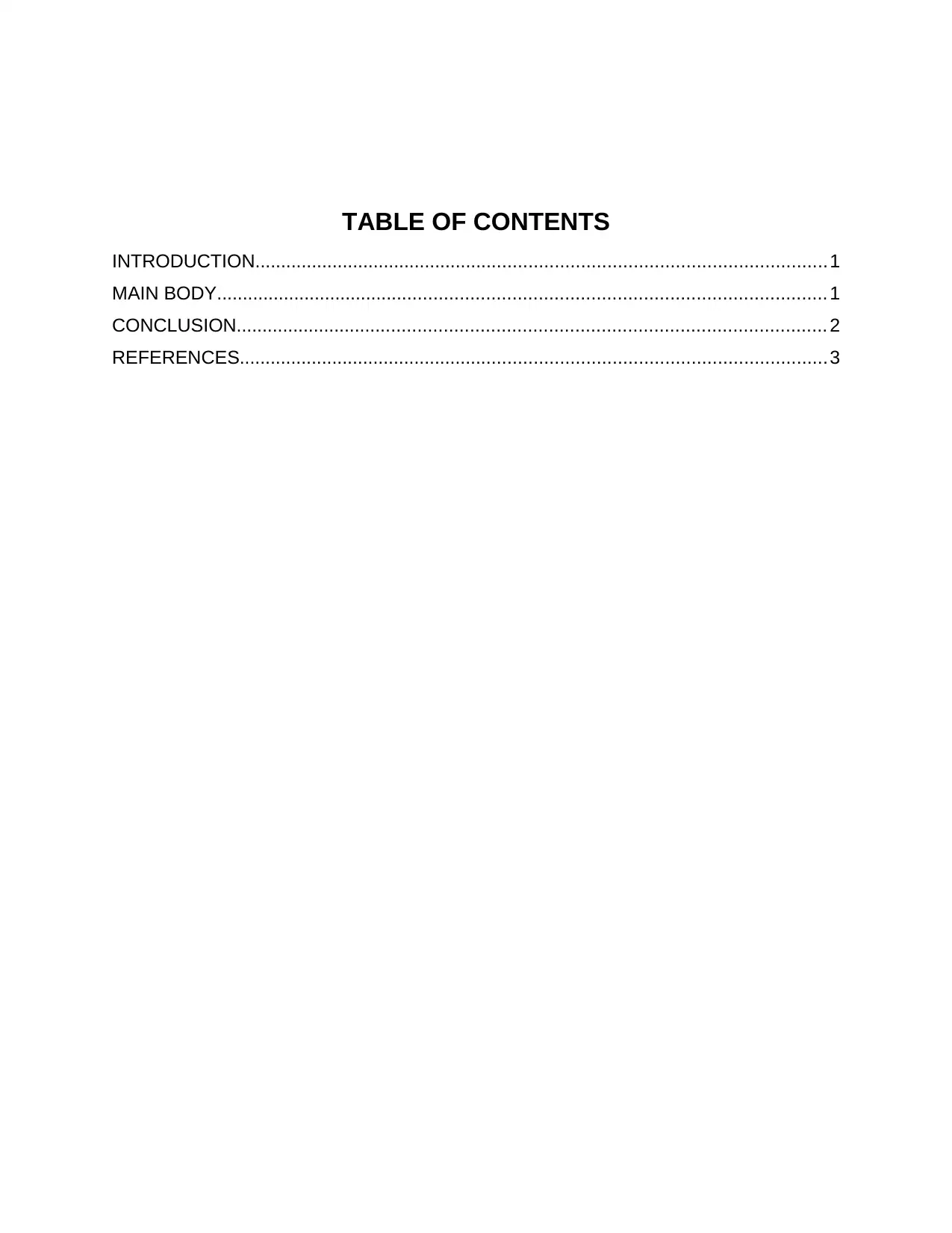
TABLE OF CONTENTS
INTRODUCTION..............................................................................................................1
MAIN BODY..................................................................................................................... 1
CONCLUSION................................................................................................................. 2
REFERENCES.................................................................................................................3
INTRODUCTION..............................................................................................................1
MAIN BODY..................................................................................................................... 1
CONCLUSION................................................................................................................. 2
REFERENCES.................................................................................................................3
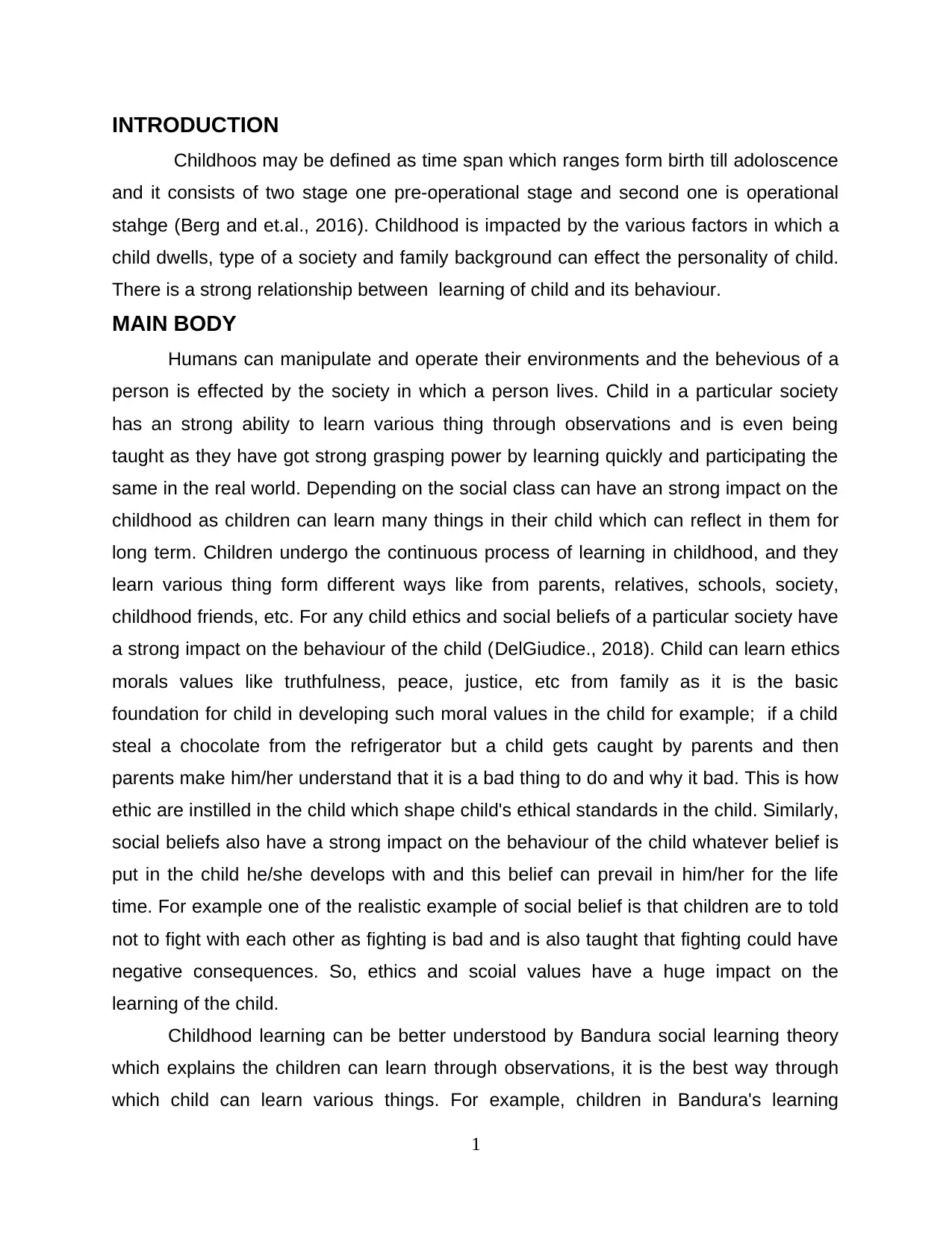
INTRODUCTION
Childhoos may be defined as time span which ranges form birth till adoloscence
and it consists of two stage one pre-operational stage and second one is operational
stahge (Berg and et.al., 2016). Childhood is impacted by the various factors in which a
child dwells, type of a society and family background can effect the personality of child.
There is a strong relationship between learning of child and its behaviour.
MAIN BODY
Humans can manipulate and operate their environments and the behevious of a
person is effected by the society in which a person lives. Child in a particular society
has an strong ability to learn various thing through observations and is even being
taught as they have got strong grasping power by learning quickly and participating the
same in the real world. Depending on the social class can have an strong impact on the
childhood as children can learn many things in their child which can reflect in them for
long term. Children undergo the continuous process of learning in childhood, and they
learn various thing form different ways like from parents, relatives, schools, society,
childhood friends, etc. For any child ethics and social beliefs of a particular society have
a strong impact on the behaviour of the child (DelGiudice., 2018). Child can learn ethics
morals values like truthfulness, peace, justice, etc from family as it is the basic
foundation for child in developing such moral values in the child for example; if a child
steal a chocolate from the refrigerator but a child gets caught by parents and then
parents make him/her understand that it is a bad thing to do and why it bad. This is how
ethic are instilled in the child which shape child's ethical standards in the child. Similarly,
social beliefs also have a strong impact on the behaviour of the child whatever belief is
put in the child he/she develops with and this belief can prevail in him/her for the life
time. For example one of the realistic example of social belief is that children are to told
not to fight with each other as fighting is bad and is also taught that fighting could have
negative consequences. So, ethics and scoial values have a huge impact on the
learning of the child.
Childhood learning can be better understood by Bandura social learning theory
which explains the children can learn through observations, it is the best way through
which child can learn various things. For example, children in Bandura's learning
1
Childhoos may be defined as time span which ranges form birth till adoloscence
and it consists of two stage one pre-operational stage and second one is operational
stahge (Berg and et.al., 2016). Childhood is impacted by the various factors in which a
child dwells, type of a society and family background can effect the personality of child.
There is a strong relationship between learning of child and its behaviour.
MAIN BODY
Humans can manipulate and operate their environments and the behevious of a
person is effected by the society in which a person lives. Child in a particular society
has an strong ability to learn various thing through observations and is even being
taught as they have got strong grasping power by learning quickly and participating the
same in the real world. Depending on the social class can have an strong impact on the
childhood as children can learn many things in their child which can reflect in them for
long term. Children undergo the continuous process of learning in childhood, and they
learn various thing form different ways like from parents, relatives, schools, society,
childhood friends, etc. For any child ethics and social beliefs of a particular society have
a strong impact on the behaviour of the child (DelGiudice., 2018). Child can learn ethics
morals values like truthfulness, peace, justice, etc from family as it is the basic
foundation for child in developing such moral values in the child for example; if a child
steal a chocolate from the refrigerator but a child gets caught by parents and then
parents make him/her understand that it is a bad thing to do and why it bad. This is how
ethic are instilled in the child which shape child's ethical standards in the child. Similarly,
social beliefs also have a strong impact on the behaviour of the child whatever belief is
put in the child he/she develops with and this belief can prevail in him/her for the life
time. For example one of the realistic example of social belief is that children are to told
not to fight with each other as fighting is bad and is also taught that fighting could have
negative consequences. So, ethics and scoial values have a huge impact on the
learning of the child.
Childhood learning can be better understood by Bandura social learning theory
which explains the children can learn through observations, it is the best way through
which child can learn various things. For example, children in Bandura's learning
1
⊘ This is a preview!⊘
Do you want full access?
Subscribe today to unlock all pages.

Trusted by 1+ million students worldwide
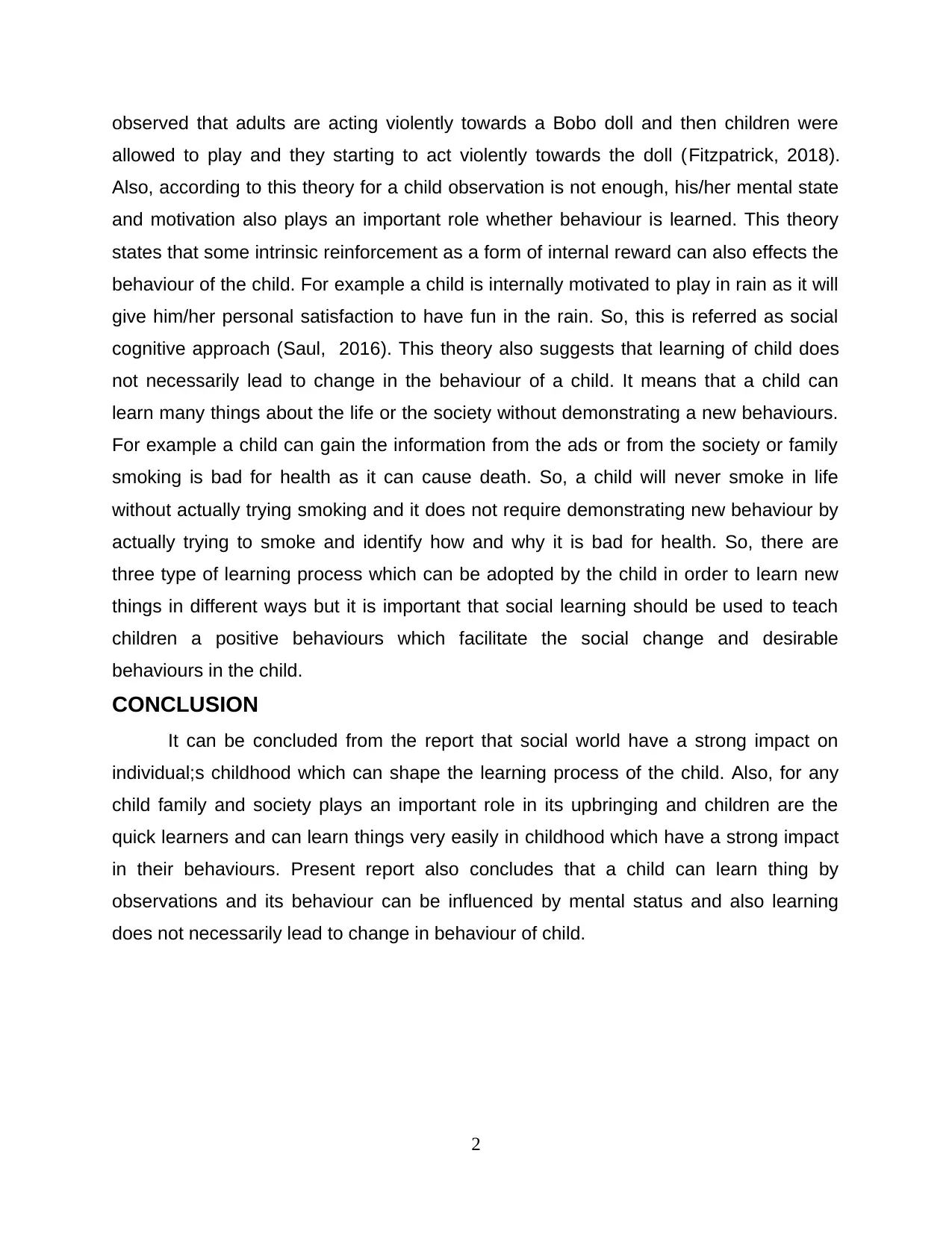
observed that adults are acting violently towards a Bobo doll and then children were
allowed to play and they starting to act violently towards the doll (Fitzpatrick, 2018).
Also, according to this theory for a child observation is not enough, his/her mental state
and motivation also plays an important role whether behaviour is learned. This theory
states that some intrinsic reinforcement as a form of internal reward can also effects the
behaviour of the child. For example a child is internally motivated to play in rain as it will
give him/her personal satisfaction to have fun in the rain. So, this is referred as social
cognitive approach (Saul, 2016). This theory also suggests that learning of child does
not necessarily lead to change in the behaviour of a child. It means that a child can
learn many things about the life or the society without demonstrating a new behaviours.
For example a child can gain the information from the ads or from the society or family
smoking is bad for health as it can cause death. So, a child will never smoke in life
without actually trying smoking and it does not require demonstrating new behaviour by
actually trying to smoke and identify how and why it is bad for health. So, there are
three type of learning process which can be adopted by the child in order to learn new
things in different ways but it is important that social learning should be used to teach
children a positive behaviours which facilitate the social change and desirable
behaviours in the child.
CONCLUSION
It can be concluded from the report that social world have a strong impact on
individual;s childhood which can shape the learning process of the child. Also, for any
child family and society plays an important role in its upbringing and children are the
quick learners and can learn things very easily in childhood which have a strong impact
in their behaviours. Present report also concludes that a child can learn thing by
observations and its behaviour can be influenced by mental status and also learning
does not necessarily lead to change in behaviour of child.
2
allowed to play and they starting to act violently towards the doll (Fitzpatrick, 2018).
Also, according to this theory for a child observation is not enough, his/her mental state
and motivation also plays an important role whether behaviour is learned. This theory
states that some intrinsic reinforcement as a form of internal reward can also effects the
behaviour of the child. For example a child is internally motivated to play in rain as it will
give him/her personal satisfaction to have fun in the rain. So, this is referred as social
cognitive approach (Saul, 2016). This theory also suggests that learning of child does
not necessarily lead to change in the behaviour of a child. It means that a child can
learn many things about the life or the society without demonstrating a new behaviours.
For example a child can gain the information from the ads or from the society or family
smoking is bad for health as it can cause death. So, a child will never smoke in life
without actually trying smoking and it does not require demonstrating new behaviour by
actually trying to smoke and identify how and why it is bad for health. So, there are
three type of learning process which can be adopted by the child in order to learn new
things in different ways but it is important that social learning should be used to teach
children a positive behaviours which facilitate the social change and desirable
behaviours in the child.
CONCLUSION
It can be concluded from the report that social world have a strong impact on
individual;s childhood which can shape the learning process of the child. Also, for any
child family and society plays an important role in its upbringing and children are the
quick learners and can learn things very easily in childhood which have a strong impact
in their behaviours. Present report also concludes that a child can learn thing by
observations and its behaviour can be influenced by mental status and also learning
does not necessarily lead to change in behaviour of child.
2
Paraphrase This Document
Need a fresh take? Get an instant paraphrase of this document with our AI Paraphraser
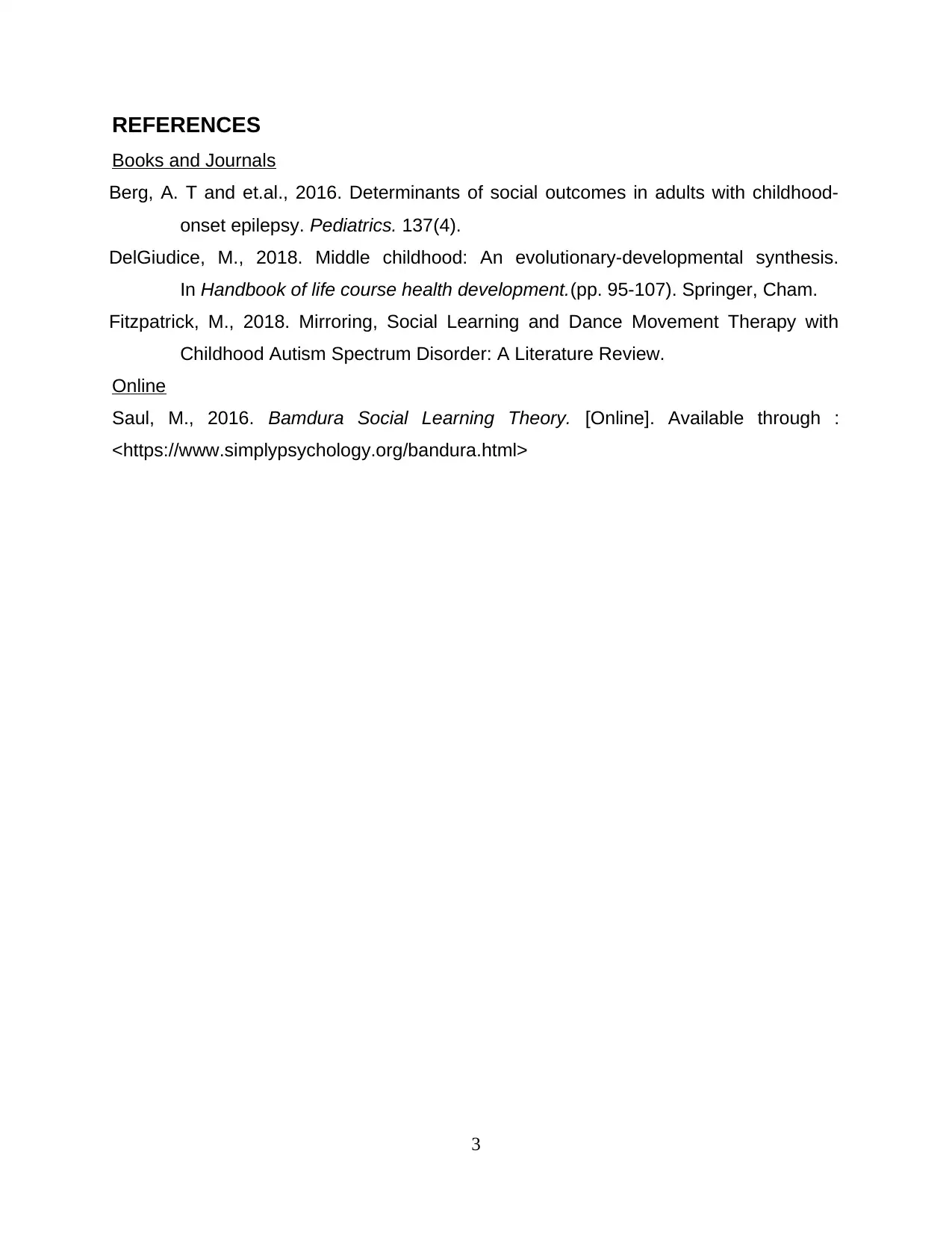
REFERENCES
Books and Journals
Berg, A. T and et.al., 2016. Determinants of social outcomes in adults with childhood-
onset epilepsy. Pediatrics. 137(4).
DelGiudice, M., 2018. Middle childhood: An evolutionary-developmental synthesis.
In Handbook of life course health development.(pp. 95-107). Springer, Cham.
Fitzpatrick, M., 2018. Mirroring, Social Learning and Dance Movement Therapy with
Childhood Autism Spectrum Disorder: A Literature Review.
Online
Saul, M., 2016. Bamdura Social Learning Theory. [Online]. Available through :
<https://www.simplypsychology.org/bandura.html>
3
Books and Journals
Berg, A. T and et.al., 2016. Determinants of social outcomes in adults with childhood-
onset epilepsy. Pediatrics. 137(4).
DelGiudice, M., 2018. Middle childhood: An evolutionary-developmental synthesis.
In Handbook of life course health development.(pp. 95-107). Springer, Cham.
Fitzpatrick, M., 2018. Mirroring, Social Learning and Dance Movement Therapy with
Childhood Autism Spectrum Disorder: A Literature Review.
Online
Saul, M., 2016. Bamdura Social Learning Theory. [Online]. Available through :
<https://www.simplypsychology.org/bandura.html>
3
1 out of 5
Related Documents
Your All-in-One AI-Powered Toolkit for Academic Success.
+13062052269
info@desklib.com
Available 24*7 on WhatsApp / Email
![[object Object]](/_next/static/media/star-bottom.7253800d.svg)
Unlock your academic potential
Copyright © 2020–2026 A2Z Services. All Rights Reserved. Developed and managed by ZUCOL.




